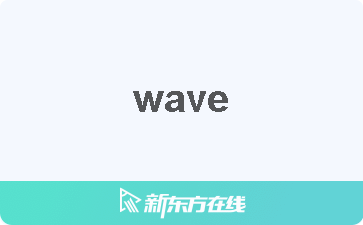- 雅思资讯
- 雅思备考
- 雅思试题
- 互动辅导
新东方-柯林斯雅思备考词典
wave
[NOUN, VERB]

waves
1. [C 可数名词] 挥(手)
A wave is a movement of the hand from side to side in the air, usually in order to say hello or goodbye to someone.
双语例句
例:Steve stopped him with a wave of the hand.
史蒂夫把手一挥,制止了他。
2. [C 可数名词] 波浪 , (尤指)海浪
A wave is a raised mass of water on the surface of water, especially the sea, which is caused by the wind or by tides making the surface of the water rise and fall.
双语例句
例:the sound of the waves breaking on the shore.
波浪拍打海岸的声音。
3. [C 可数名词] (头发的)波浪卷 , 鬈曲
If someone's hair has waves, it curves slightly instead of being straight.
双语例句
例:Her blue eyes shone and caught the light, and so did the platinum waves in her hair.
她蓝色的眼睛闪闪发光,白金色的波浪发卷也闪闪发光。
4. [C 可数名词] (地震、爆炸的)冲击波
A wave is a sudden increase in heat or energy that spreads out from an earthquake or explosion.
双语例句
例:The shock waves of the earthquake were felt in Teheran.
地震带来的冲击波在德黑兰也能感觉到。
例:the seismic waves generated by natural earthquakes.
自然地震产生的地震波。
5. [C 可数名词] (光、声、无线电等的)波
Waves are the form in which things such as sound, light, and radio signals travel.
双语例句
例:Regular repeating actions such as sound waves, light waves, or radio waves have a certain frequency, or number of waves per second.
有规律的重复活动如声波、光波、无线电波都有一个特定的频率,或者说是每秒的波动次数。
例:the wave amplitude of light.
光波的振幅。
6. [C 可数名词] (情绪的)波动
If you refer to a wave of a particular feeling, you mean that it increases quickly and becomes very intense, and then often decreases again.
双语例句
例:She felt a wave of panic, but forced herself to leave the room calmly.
她感到一阵惊慌,但还是强作镇定地离开了房间。
7. [C 可数名词] (活动或行为的)突然爆发 , 浪潮
A wave is a sudden increase in a particular activity or type of behaviour, especially an undesirable or unpleasant one.
双语例句
例:the current wave of violence.
当前的暴力浪潮。
NOUN. 名词
waves , waving , waved
1. [I 不及物动词] 挥(手以示意)
If you wave or wave your hand, you move your hand from side to side in the air, usually in order to say hello or goodbye to someone.
双语例句
例:Jessica caught sight of Lois and waved to her.
杰茜卡看到洛伊丝,向她挥了挥手。
例:He grinned, waved, and said, 'Hi!'
他咧嘴笑笑,挥挥手,说道:“嗨!”
2. [T 及物动词] 挥手(示意某人离开、前进等)
If you wave someone away or wave them on, you make a movement with your hand to indicate that they should move in a particular direction.
双语例句
例:Leshka waved him away with a show of irritation.
廖什卡生气地挥手示意他离开。
例:He waited for a policeman to stop the traffic and wave the people on.
他等着警察来让车辆停下,指挥人们前行。
3. [T 及物动词] 挥舞
If you wave something, you hold it up and move it rapidly from side to side.
双语例句
例:Hospital staff were outside to welcome him, waving flags and applauding.
医院的工作人员都在外面一边挥动旗子一边鼓掌欢迎他。
4. [I 不及物动词] 飘扬 , 摆动
If something waves, it moves gently from side to side or up and down.
近义词
双语例句
例:grass and flowers waving in the wind.
随风摇曳的花草。